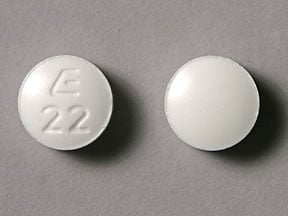
Orphenadrine ER Coupons & Savings Card – Discount Prices from $12.13
Orphenadrine is a medication designed to alleviate muscle spasms and pain, typically in conjunction with rest, physical therapy, and other treatments. As a muscle relaxant, its precise mechanism is not fully understood, but it is believed to function by interfering with nerve signals in the nervous system, rather than acting directly on the muscles. Orphenadrine is available in both oral tablet form and as an injectable, administered by a healthcare professional in specific cases. Users may experience side effects such as dry mouth, headache, and drowsiness. While the brand-name version, Norflex, is no longer available, Orphenadrine remains an effective generic option for managing short-term muscle discomfort.
Our coupons are free to use. Before paying, show the pharmacist your Orphenadrine ER savings card to get your free discount. Use our filters below to edit the prescription box to match your needs. The Orphenadrine ER prices will update based on your prescription needs. Above our Orphenadrine ER coupons, you can change your location to see pharmacy prices and costs in other areas. We're here to help you buy Orphenadrine ER at the lowest price with our prescription discount card.
My prescription
Edit
100MG, Orphenadrine ER (20 Tablet Extended Release 12 Hours)
Select pharmacy

CVS
$20.79
COUPON PRICE
Walmart
$12.13
COUPON PRICE
Albertsons
$12.17
COUPON PRICE
Walgreens
$17.02
COUPON PRICEOrphenadrine ER savings card
Show this card to your pharmacist
Walmart
$12.13
BIN
ID
PCN
GRP
019876
LHDC4E7446
CHIPPO
LHX
Powered by
Orphenadrine is a medication designed to alleviate muscle spasms and pain, typically in conjunction with rest, physical therapy, and other treatments. As a muscle relaxant, its precise mechanism is not fully understood, but it is believed to function by interfering with nerve signals in the nervous system, rather than acting directly on the muscles. Orphenadrine is available in both oral tablet form and as an injectable, administered by a healthcare professional in specific cases. Users may experience side effects such as dry mouth, headache, and drowsiness. While the brand-name version, Norflex, is no longer available, Orphenadrine remains an effective generic option for managing short-term muscle discomfort.
Our coupons are free to use. Before paying, show the pharmacist your Orphenadrine ER savings card to get your free discount. Use our filters below to edit the prescription box to match your needs. The Orphenadrine ER prices will update based on your prescription needs. Above our Orphenadrine ER coupons, you can change your location to see pharmacy prices and costs in other areas. We're here to help you buy Orphenadrine ER at the lowest price with our prescription discount card.
More prescriptions for musculoskeletal conditions
coupons from$100.64Save 72%
coupons from$2171.46Save 15%
coupons from$15.72Save 78%
coupons from$10.81Save 74%
coupons from$46.32Save 92%
coupons from$4.36Save 83%
coupons from$1849.31Save 19%
coupons from$49.00Save 97%
More prescriptions for musculoskeletal conditions
Carisoprodol-aspirin-codeine Save 72%coupons from $100.64
Orphengesic Forte Save 15%coupons from $2171.46
Soma Save 78%coupons from $15.72
Fexmid Save 74%coupons from $10.81
Lorzone Save 92%coupons from $46.32
Valium Save 83%coupons from $4.36
Valtoco 5 Mg Dose Save 19%coupons from $1849.31
Amrix Save 97%coupons from $49.00
Orphenadrine ER dosage forms
Use our Orphenadrine ER 100MG coupon with prices from $12.13 for 20 Tablet Extended Release 12 Hours. You can also use our Orphenadrine ER 100MG coupon with prices from $7.31 for 10 Tablet Extended Release 12 Hours. We have a Orphenadrine ER 100MG coupon with prices from $9.24 for 14 Tablet Extended Release 12 Hours. You can use our Orphenadrine ER 100MG coupon with prices from $9.72 for 15 Tablet Extended Release 12 Hours.
Dosage Quantity Price from Per unit 100MG 20 Tablet Extended Release 12 Hours $12.13 $0.61 100MG 10 Tablet Extended Release 12 Hours $7.31 $0.73 100MG 14 Tablet Extended Release 12 Hours $9.24 $0.66 100MG 15 Tablet Extended Release 12 Hours $9.72 $0.65 100MG 28 Tablet Extended Release 12 Hours $15.98 $0.57 100MG 30 Tablet Extended Release 12 Hours $16.94 $0.56 100MG 40 Tablet Extended Release 12 Hours $21.76 $0.54 100MG 42 Tablet Extended Release 12 Hours $22.72 $0.54 100MG 45 Tablet Extended Release 12 Hours $23.89 $0.53 100MG 56 Tablet Extended Release 12 Hours $25.26 $0.45
| Dosage | Quantity | Price from | Per unit |
|---|---|---|---|
| 100MG | 20 Tablet Extended Release 12 Hours | $12.13 | $0.61 |
| 100MG | 10 Tablet Extended Release 12 Hours | $7.31 | $0.73 |
| 100MG | 14 Tablet Extended Release 12 Hours | $9.24 | $0.66 |
| 100MG | 15 Tablet Extended Release 12 Hours | $9.72 | $0.65 |
| 100MG | 28 Tablet Extended Release 12 Hours | $15.98 | $0.57 |
| 100MG | 30 Tablet Extended Release 12 Hours | $16.94 | $0.56 |
| 100MG | 40 Tablet Extended Release 12 Hours | $21.76 | $0.54 |
| 100MG | 42 Tablet Extended Release 12 Hours | $22.72 | $0.54 |
| 100MG | 45 Tablet Extended Release 12 Hours | $23.89 | $0.53 |
| 100MG | 56 Tablet Extended Release 12 Hours | $25.26 | $0.45 |
| 100MG | 60 Tablet Extended Release 12 Hours | $25.76 | $0.43 |
| 100MG | 90 Tablet Extended Release 12 Hours | $37.49 | $0.42 |
| 100MG | 100 Tablet Extended Release 12 Hours | $38.73 | $0.39 |
| 100MG | 120 Tablet Extended Release 12 Hours | $41.22 | $0.34 |
| 100MG | 500 Tablet Extended Release 12 Hours | $88.45 | $0.18 |
| 100MG | 1000 Tablet Extended Release 12 Hours | $150.60 | $0.15 |
